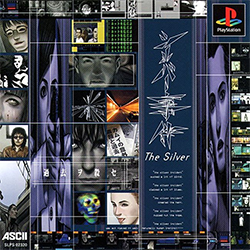The Silver Case
| The Silver Case | |
|---|---|

PlayStation cover art
|
|
| Developer(s) | Grasshopper Manufacture |
| Publisher(s) | ASCII Entertainment |
| Distributor(s) | Limited Run Games (PC) |
| Director(s) | Goichi Suda |
| Producer(s) | Hiroyuki Tamura |
| Designer(s) | Goichi Suda |
| Programmer(s) | Yuichi Ogawa Masashi Niwano Toshihiro Fujikawa |
| Artist(s) | Takashi Miyamoto |
| Writer(s) | Goichi Suda Masahi Ooka Sako Kato |
| Composer(s) | Masafumi Takada |
| Platform(s) | PlayStation Microsoft Windows OS X PlayStation 4 |
| Release | |
| Genre(s) | Adventure, visual novel |
| Mode(s) | Single-player |
| Review scores | ||
|---|---|---|
| Publication | Score | |
| PC | PS | |
| Famitsu | 30/40 | |
| GameSpot | 5/10 | |
| PC Gamer (US) | 50% | |
| Hardcore Gamer | 4/5 | |
| RPGFan | 88% | |
| Aggregate score | ||
| Metacritic | 67/100 (9 reviews) |
|
The Silver Case (Japanese: シルバー事件 Hepburn: Shirubā Jiken?) is an adventure visual novel video game developed by Grasshopper Manufacture and published by ASCII Entertainment for the PlayStation in 1999. It was directed, designed and co-written by Goichi Suda. A remastered version was released digitally by Grasshopper Manufacture worldwide for Microsoft Windows and OS X in 2016, while a port for the PlayStation 4 will be released by NIS America in 2017. A port for the Nintendo DS was also in development, but never released due to Suda's dissatisfaction with the final product.
The setting is contemporary Japan, and takes place in a universe which would be used by Suda in later works. Within a city called the 24 Districts, a series of bizarre murders occurs, prompting the 24 Districts Police Department to send two detectives from their High-degree Murder Division to solve the case. The killings are soon linked to Kamui Uehara, a notorious serial killer who supposedly died several years before. The gameplay revolves around text-based situations, point-and-click mechanics, and interactive question and answer segments.
The Silver Case was the debut title of Grasshopper Manufacture, beginning development with the studio's formation in 1998. As they had limited staff and resources, Suda devised the window-based story-telling to make best use of their assets. The story, written by Suda, Masahi Ooka and Sako Kato revolved around themes of crime and the clashing of people on different sides: its themes would become a recurring feature in later titles developed by Suda. The character designs were done by Takashi Miyamoto, while the music was composed by Masafumi Takada.
...
Wikipedia
